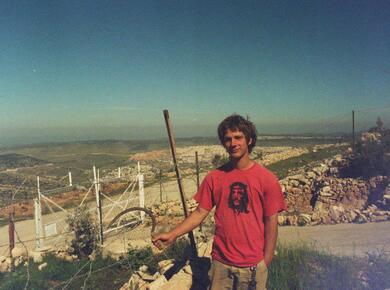Posted: April 9, 2024
Germany
After high school, I spent a year in the Israeli-Occupied West Bank, living and working at Tent of Nations, a Palestinian Christian ecological peace project. I learned many things during this time: from cooking on an open fire and caring for animals to recovering from tear gas by smelling raw onion.
But the most transformative and lasting learnings concerned how I understand and follow Jesus.
It was Palestinian Christians who taught me to see that Bethlehem, Nazareth and Jerusalem are real places whose histories shaped Jesus. His context, plagued by military, economic and cultural oppression, was not so different from the situation of Palestinians growing up today in refugee camps in the West Bank or Gaza. Now as then, injustice breeds resentment and repression creating spirals of violence and complex patterns of trauma which seem inescapable.
Solidarity with the oppressed
It is in this wounded world that God chose to come and be in solidarity with the oppressed and model a different way to struggle for dignity and freedom – one that sets both victim and oppressor free.
The Nassars, my Palestinian Lutheran hosts, taught me how to put Jesus’ teaching to love our enemies into practice. On boulders originally placed by Israeli soldiers as a roadblock they wrote their manifesto: “We refuse to be enemies.”
I witnessed Daher Nassar invite armed settlers who broke into his land for tea, causing them to retreat confused. At the same time, the Nassars refused to give up on their connection to the land and their dream of a shared future for all.
The Jewish and Muslim members of Bereaved Parents Circle also taught me a new understanding of forgiveness. As they came together to mourn the deaths of their children in the conflict, they realized that retaliation did not bring life. Only forgiveness had the power to set people free from bitterness, free to work for liberation for all.
Reconciliation over recrimination
Having witnessed these living stones before me helped me honestly face my own entanglement in this conflict. Both my grandfathers fought in the Nazi army and contributed to the murder of six million Jews in Europe. Jews refer to this atrocity as the Shoah, a Hebrew word meaning “catastrophe.” This heinous crime against humanity represents the culmination of 2 000 years of dehumanization and terror toward Jews.
It bears repeating that this violence was perpetrated out especially by Christians. Gentiles who forgot that they were adopted into God’s people by grace.
Antisemitism is the trauma that created the need for a Jewish state. Yet this state was not founded on “empty land,” as the common colonial trope goes, but by displacing hundreds of thousands of Palestinians, whose children and grandchildren still live as stateless refugees around the world. Palestinians refer to this as the “Nakba” – Arabic for “catastrophe”.
These twin catastrophes are the foundational wounds of the two people, and as is common with wounds, we usually pay more attention to our own.
Stories that unsettle
In conversations with Israeli and Palestinian peace activists, I was humbled to learn that owning my legacy of my entanglement in violence did not taint me. Instead, it opened up conversations about what repentance and reconciliation can look like.
These activists shared about their slow and painful realization that they had been lied to. While the Shoah was central to Israeli education, they had never learned about the Nakba.
Meanwhile, Palestinian schools portrayed the Zionists only as colonizers, while omitting that they were fleeing genocidal violence in Europe.
From the peace activists, I learned the importance of sharing our stories and allowing for another’s truth to unsettle us. To work for a just and lasting peace between the Mediterranean and the Jordan River, we must repent both of our deep-seated antisemitism as well as our colonial imagination and resist their manifestations in our societies today.
There is an image that grounds my hope. Each year, the Nassars invited people to the vineyard to help with the harvest and provide a nonviolent deterrence to settler violence. I remember harvesting buckets and buckets of the sweetest grapes I have ever eaten together with dozens of volunteers from around the world – including some Israelis.
Both the Israelis and my Palestinian hosts took considerable risks in this encounter as there are people on both sides adamantly opposed to any form of coexistence. Yet they consciously took the risk, because they were convicted that peace requires relationships of trust and solidarity that only grow with time and shared labour.
The joy at this harvest and the feast of hummus, olives, and falafel at lunch break has become a foretaste of the kin-dom of heaven I cherish and long to taste again.
—Benjamin Isaak-Krauß co-pastors with his spouse Rianna at Mennonitengemeinde Frankfurt, a congregation of Arbeitsgemeinschaft Mennonitischer Gemeinden (AMG) in Germany. He represents the Deutsche Mennonitische Friedenskomitee (German Mennonite Peace Committee) on the steering committee of Community Peacemaker Teams.
Click here to learn about Tent of Nations


Join the Conversation on Social Media
FacebookTwitterInstagramFlickrYouTube